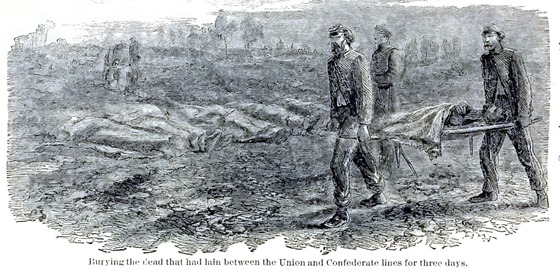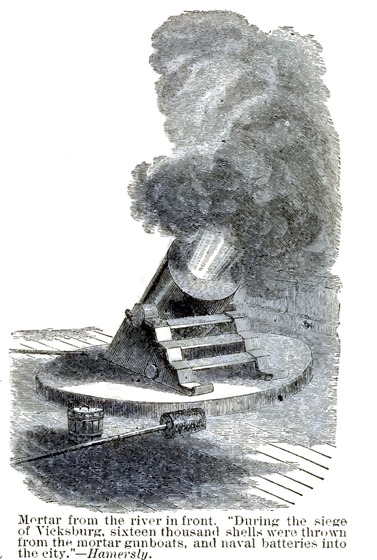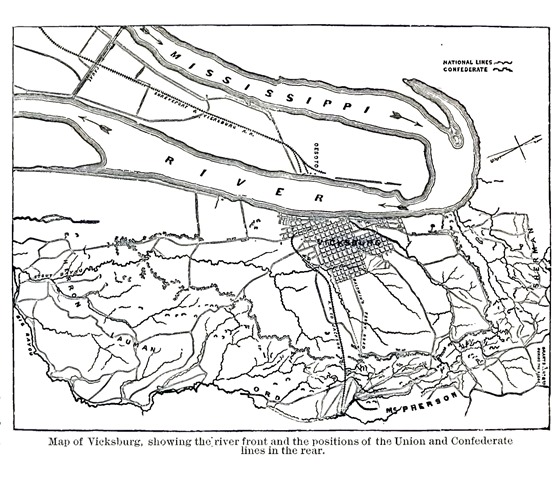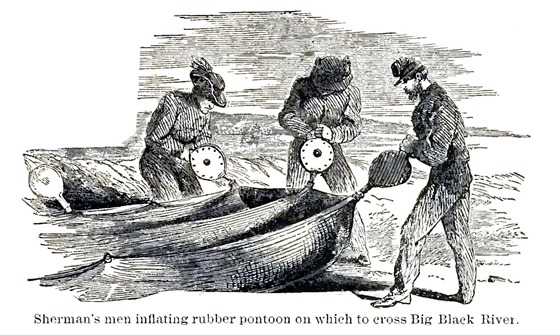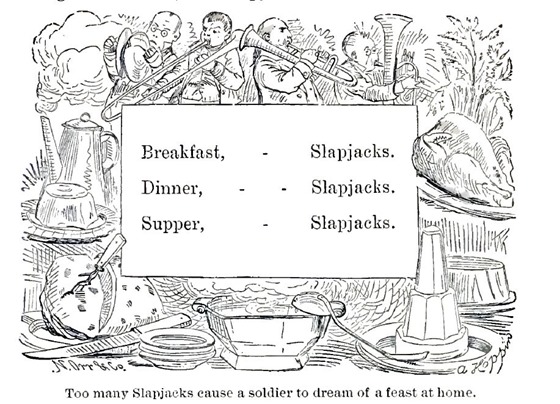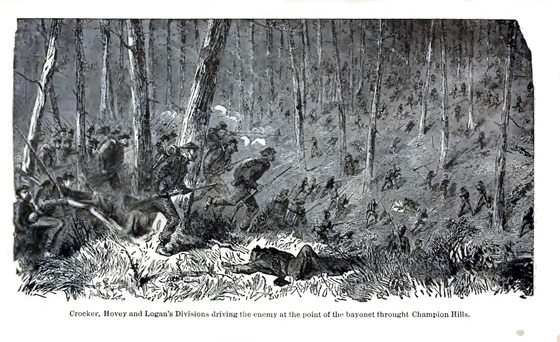MAY 25TH.—Pemberton sent a flag of truce to Grant at two P. M., and the cessation of hostilities thus agreed on, lasted till eight o’clock in the evening. It made us happy, for we fancied it was a sign they wanted to surrender—but no such good luck. It was simply to give both sides a chance to bury their dead, which had been lying exposed since the twenty-second. Both armies issued from their respective fortifications and pits, and mingled together in various sports, apparently with much enjoyment. Here a group of four played cards—two Yanks and two Rebs. There, others were jumping, while everywhere blue and gray mingled in conversation over the scenes which had transpired since our visit to the neighborhood. I talked with a very sensible rebel, who said he was satisfied we should not only take Vicksburg, but drive the forces of the south all over their territory, at last compelling them to surrender; still, he said, he had gone into the fight, and was resolved not to back out. He said they had great hope of dissension in the north, to such an extent as might strengthen their cause. There have been grounds for this hope, I am sorry to say, and such dissensions at the north must prolong the war, if our peace party should succeed in materially obstructing the war measures of government. From the remarks of some of the rebels, I judged that their supply of provisions was getting low, and that they had no source from which to draw more. We gave them from our own rations some fat meat, crackers, coffee and so forth, in order to make them as happy as we could. We could see plainly that their officers watched our communications closely.
A Soldier’s Story of the Siege of Vicksburg–Osborn H. Oldroyd
MAY 24TH.—Sunday; and how little like the Sabbath day it seems. Cannon are still sending their messengers of death into the enemy’s lines, as on week days, and the minnie balls sing the same song, while the shovel throws up as much dirt as on any other day. What a relief it would be if, by common consent, both armies should cease firing to-day. It is our regiment’s turn to watch at the front, so before daylight we moved up and took our position. We placed our muskets across the rifle pits, pointing towards the fort, and then lay down and ran our eyes over the gun, with finger on trigger, ready to fire at anything we might see moving. For hours not a movement was seen,  till finally an old half-starved mule meandered too close to our lines, when off went a hundred or more muskets, and down fell the poor mule. This little incident, for a few minutes, broke the monotony. A coat and hat were elevated on a stick above our rifle pits, and in an instant they were riddled with bullets from the enemy. The rebels were a little excited at the ruse, and probably thought, after their firing, there must be one less Yankee in our camp. In their eagerness a few of them raised their heads a little above their breastworks, when a hundred bullets flew at them from our side. They all dropped instantly, and we could not tell whether they were hit or not. The rebels, as well as ourselves, occasionally hold up a hat by way of diversion. A shell from an enemy’s gun dropped into our camp rather unexpectedly, and bursted near a group, wounding several, but only slightly, though the doctor thinks one of the wounded will not be able to sit down comfortably for a few days. I suppose, then, he can go on picket, or walk around and enjoy the country.
till finally an old half-starved mule meandered too close to our lines, when off went a hundred or more muskets, and down fell the poor mule. This little incident, for a few minutes, broke the monotony. A coat and hat were elevated on a stick above our rifle pits, and in an instant they were riddled with bullets from the enemy. The rebels were a little excited at the ruse, and probably thought, after their firing, there must be one less Yankee in our camp. In their eagerness a few of them raised their heads a little above their breastworks, when a hundred bullets flew at them from our side. They all dropped instantly, and we could not tell whether they were hit or not. The rebels, as well as ourselves, occasionally hold up a hat by way of diversion. A shell from an enemy’s gun dropped into our camp rather unexpectedly, and bursted near a group, wounding several, but only slightly, though the doctor thinks one of the wounded will not be able to sit down comfortably for a few days. I suppose, then, he can go on picket, or walk around and enjoy the country.
MAY 23D.—Our regiment lay in the rifle pits to-day, watching the enemy. For hours we were unable to see the motion of a man or beast on their side, all was so exceedingly quiet throughout the day. After dark we were relieved, and as we returned to the camp the enemy got range of us, and for a few minutes their bullets flew about us quite freely. However, we bent our heads as low as we could and double-quicked to quarters. One shot flew very close to my head, and I could distinctly recognize the familiar zip and whiz of quite a number of others at a safer distance. The rebels seemed to fire without any definite direction. If our sharpshooters were not on the alert, the rebels could peep over their works and take good aim; but as they were so closely watched they had to be content with random shooting.
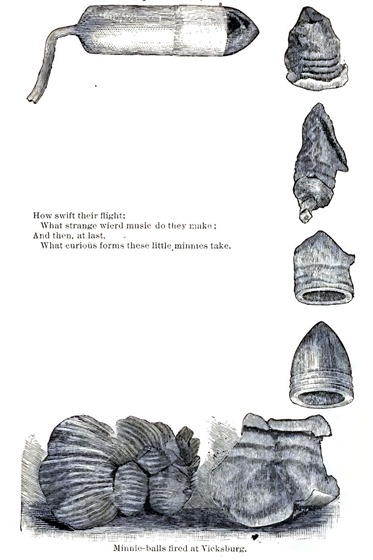 If this siege is to last a month there will be a whole army of trained sharpshooters, for the practice we are getting is making us skilled marksmen. I have gathered quite a collection of balls, which I mean to send home as relics of the siege. They are in a variety of shapes, and were a thousand brought together there could not be found two alike. I have picked up some that fell at my feet—others were taken from trees. I am the only known collector of such souvenirs, and have many odd and rare specimens. Rebel bullets are very common about here now—too much so to be valuable; and as a general thing the boys are quite willing to let them lie where they drop. I think, however, should I survive, I would like to look at them again in after years.
If this siege is to last a month there will be a whole army of trained sharpshooters, for the practice we are getting is making us skilled marksmen. I have gathered quite a collection of balls, which I mean to send home as relics of the siege. They are in a variety of shapes, and were a thousand brought together there could not be found two alike. I have picked up some that fell at my feet—others were taken from trees. I am the only known collector of such souvenirs, and have many odd and rare specimens. Rebel bullets are very common about here now—too much so to be valuable; and as a general thing the boys are quite willing to let them lie where they drop. I think, however, should I survive, I would like to look at them again in after years.
Shovel and pick are more in use to-day, which seems to be a sign that digging is to take the place of charging at the enemy. We think Grant’s head is level, anyhow. The weather is getting hotter, and I fear sickness; and water is growing scarce, which is very annoying. If we can but keep well, the future has no fears for us.
MAY 22ND. —Last night mortar-shells, fired from the boats on the river in front of the city across Point Louisiana, fell thick over all parts of Vicksburg, and at three o’clock this morning every cannon along our line belched its shot at the enemy. Nothing could be heard at the time but the thundering of great guns—one hundred cannons sent crashing into the town —parrot, shrapnell, cannister, grape and solid shot—until it seemed impossible that anything could withstand such a fearful hailstorm. It was indeed a terrible spectacle—awfully grand.
At ten o’clock we had orders to advance. The boys were expecting the order and were busy divesting themselves of watches, rings, pictures and other keepsakes, which were being placed in the custody of the cooks, who were not expected to go into action. I never saw such a scene before, nor do I ever want to see it again. The instructions left with the keepsakes were varied. For instance, “This watch I want you to send to my father if I never return”—”I am going to Vicksburg, and if I do not get back just send these little trifles home, will you?”—proper addresses for the sending of the articles being left with them. Not a bit of sadness or fear appears in the talk or faces of the boys, but they thought it timely and proper to dispose of what they had accordingly. This was done while we awaited orders, which at last came in earnest, and in obedience to them we moved up and took our place in the rifle pits within a hundred yards of Fort Hill, where we had orders to keep a diligent watch, and to fire at the first head that dared to show itself. The air was so thick with the smoke of cannon that we could hardly see a hundred yards before us. The line to our right and left was completely hidden from view except as revealed by the flash of guns, and the occasional bursting of shells through the dense clouds. About eleven o’clock came a signal for the entire line to charge upon the works of the enemy. Our boys were all ready, and in an instant leaped forward to find victory or defeat. The seventh Missouri took the lead with ladders which they placed against the fort, and then gave way for others to scale them. Those who climbed to the top of the fort met cold steel, and, when at length it was found impossible to enter the fort that way, the command was given to fall back, which was done under a perfect hail of lead from the enemy. The rebels, in their excitement and haste to fire at our retreating force, thrust their heads a little too high above their cover,—an advantage we were quick to seize with well aimed volleys. In this charge a severe loss was met by our division, and nothing gained. What success was met by the rest of the line I can not say, but I hope it was better than ours. Thus ended another day of bloody fight in vain, except for an increase of the knowledge which has been steadily growing lately, that a regular siege will be required to take Vicksburg. This day will be eventful on the page of history, for its duties have been severe, and many a brave patriot bit the dust under the storm of deadly fire that assailed us.
MAY 21ST.—We were relieved this morning before daylight, and slipped back to our camp as quietly as we could. The rifle pits where we watched were pretty close to the enemy, and we had to note every movement made by them. If they put their heads above their works we sent a hundred or more shots at them, and on the other hand, if any on our side made themselves too conspicuous, they fired in turn. So each army is watching the other like eagles. We must be relieved while it is yet dark, for if such a move were attempted by daylight, the enemy could get our range and drop many a man.
The weather is getting very hot, but we do our best to keep cool whether out of battle or in it. It is fortunate for us that our work at the rifle pits occurs at night, when the air is much more cool and pleasant, and the services less fraught with danger. Last night quite a number of new pits were opened and gabions placed on them. Firing from behind these was attended with leas danger. Gabions are a sort of wicker-work, resembling round baskets, filled with dirt. The rebel fort in our front was made by cutting away the back half of the hill, leaving the face towards us in a state of nature. This fort is supplied with large guns, but their owners can not use them, as our rifle pits occupy higher ground, from which we watch them too closely.
MAY 20TH.—When I awoke this morning I offered thanks to God that my life had been spared thus far. We slept on our arms—something unusual. This day has been busily spent in making cautious advances toward the works of the enemy, and, although our progress seems to have been very little, we are content to approach step by step, for the task is difficult and dangerous. Bullets are flying over our heads, and it is quite common to see the boys trying to dodge them. A few have succeeded in stopping these bullets, but they had to leave at once for the hospital. A blanket displayed by its owner was called a map of the confederacy, on account of the holes in it made by bullets at Raymond and Champion Hills. It is good enough yet for warmth, but will not do to hold water. We are ragged and dirty, for we have had no change of clothes for over a month. But we have the promise of new suits soon. If we were to enter Vicksburg to-morrow, some of our nice young fellows would feel ashamed to march before the young ladies there. We can see the court house in the city with a confederate flag floating over it. What fun it will be to take that down, and hoist in its stead the old stars and stripes. Then yonder is the Mississippi river again; we want to jump into that once more and have a good bath. The hills back of Vicksburg, and in fact all round the city seem quite steep and barren, and to run in parallels, affording our troops good shelter from batteries and secret approaches. It is upon these hills opposite the town that our tents are pitched. We must cut back into the hills to escape the shower of bullets, for we like to feel secure, when asleep or off duty. A great many of the balls that come over are what are called “spent,” that is, have not force enough left to do any harm. We do not feel quite as safe awake or asleep as we did before we got so near the city. However, we manage to sleep pretty much unconcerned as to danger. Our regiment is detailed to watch at the rifle pits in front to-night.
MAY 19TH.—This day beholds a cordon of steel, with rivets of brave hearts, surrounding Vicksburg. The enemy left their fortifications on the first, twelfth, fourteenth, sixteenth and eighteenth of this month, and dealt their best blows to prevent the occurrence of what we have just accomplished—the surrounding of their well fortified city. We have now come here to compel them to surrender, and we are prepared to do it either by charge or by siege, and they cannot say to us nay. They have fought well to keep their homes free from invasion, and surely deserve praise for their brave return to battle after so many defeats. Our army encircles the city from the river above to the river below, a distance of seven and a half miles.
The three corps have taken respective positions as follows: Sherman‘s Fifteenth occupies the right of the line, resting on the river above; General McClernand’s Thirteenth touches the river below, while McPherson’s Seventeenth stands in the center. Our own division, commanded by Logan, occupies the road leading to Jackson.
In taking our position we did a great deal of skirmishing, and I suppose the same difficulty was probably experienced by the rest of the line. We have been nineteen days on the march around Vicksburg, and the time has been full of excitement—quite too varied for a comprehensive view just now, but those who have borne a part in it will store it all away in memory, to be gone over between comrades by piece-meal, when they meet after the war is over.
The personal experience of even the humblest soldier will get a hearing in years to come, for it is the little things in an unusual life that are most entertaining, and personal observations from the rank and file, narrated by those who saw what they describe, will make some of the most instructive paragraphs of the war’s history.
This has been a day to try the nerves of the boys, while taking position in front to invest the doomed city. It has been a day to try men’s souls, and hearts, too. The long lines of rebel earthworks following the zig-zag courses of the hills, and black field guns still menacing from their port-holes, bristle with defiance to the invaders.
Our regiment, the 20th Ohio, being ordered in position on the Jackson road, immediately passed to the left in front of Fort Hill, where it stood ready to charge at a moment’s notice. Meanwhile Colonel Force cautiously made his way in front of the different companies and spoke familiarly to his men words of encouragement. Said he, “boys, I expect we shall be ordered to charge the fort. I shall run right at it, and I hope every man will follow me.” At that instant a soldier of one of the companies on the left was found snugly hid in a ravine under the roots of a tree, and his lieutenant’s attention being called to the fact, he was ordered out, when he replied, “lieutenant, I do not believe I am able to make such a charge.”
MAY 18TH.—The army last night made pontoons, on which this morning the Black River has been crossed. McClernand is on the left, McPherson in the center, and Sherman on the right. In this position the three great corps will move to Vicksburg by different roads. We are nearing the doomed city, and are now on the lookout for fun.
As we crossed the river and marched up the bank, a brass band stood playing national airs. O, how proud we felt as we marched through the rebel works, and up to the muzzles of the abandoned guns that had been planted to stay our progress. Every man felt the combined Confederate army could not keep us out of Vicksburg. It was a grand sight, the long lines of infantry moving over the pontoons, and winding their way up the bluffs, with flags flying in the breeze, and the morning sun glancing upon the guns as they lay across the shoulders of the boys. Cheer after cheer went up in welcome and triumph from the thousands who had already crossed and stood in waiting lines upon the bluff above. This is supposed to be the last halting place before we knock for admittance at our goal—the boasted Gibraltar of the west.
Our division has made a long march to-day, and we have bivouaced for the night without supper, and with no prospect of breakfast, for our rations have been entirely exhausted. Murmurings and complaints are loud and deep, and the swearing fully up to the army standard. General Leggett walked into our camp, and in his usual happy way inquired, “Well, boys, have you had your supper?” “No, General, we have not had any.” “Well, boys, I have not had any either, and we shall probably have to fight for our breakfast.” “Very well, General ; guess we can stand it as well as you,” came the ready answer from a score of us, and resignation settled back upon the features of tired and hungry, but unsubdued, patriot soldiers.
“You may study the hopeful, bright brows of these men,
Who have marched all day over hill and through glen,
Half clad and unfed; but who is it will dare
Claim to find on those faces one trace of despair?”
MAY 17TH.—On the road to Vicksburg, resolved to capture the city or get badly whipped. We have not known defeat since we left Fort Donelson, and we propose to keep our good record up. We have seen hard times on some hotly contested fields, but mean to have nothing but victory, if possible, on our banner.
The advance of our army has made a grand sweep, pell-mell, over the rebel works at Big Black River, routing the foe and capturing twenty-five hundred prisoners with twenty-nine cannon. Their rifle pits were quite numerous, but they were all on low ground, so that when the word was given the Yankees rushed over them with the greatest ease. The rebs may be drawing us into a trap, but as yet we have not a moments’ fear of the result, for when Grant tells us to go over a thing we go, and feel safe in going. Even in time of peace we would not wish the great curtain that hides the future to be rolled away, nor do soldiers now ask to know what lies before them. But every day brings new scenes fraught with dangers, hair-breadth escapes or death, after which the ranks close and move on undaunted. And our love of country still grows as we go.
We camped within a few miles of Black River, perfectly satisfied, though we have had no hand in the slaughter to-day. We rather expected to be halted a few days at the river, where the enemy would surely be strongly fortified, and where, as they could certainly spare the greater part of their forces from Vicksburg, if they would but bring them out, they could make a desperate stand. We are now fighting hard for our grub, since we have nothing left but flour, and slapjacks lie too heavy on a soldier’s stomach. But there is great consolation in reflecting that behind us Uncle Sam keeps piled a bountiful supply all ready to be issued as soon as we can find a proper halting place.
MAY 16TH.—We rolled out of bed this morning early, and had our breakfast of slapjacks made of flour, salt and water, which lie on a man’s stomach like cakes of lead—for we are out of all rations but flour and salt, though we hope soon for some variety. We heard heavy firing about eleven o’clock. Our division reached Champion Hill about two P. M., and filed into a field on the right of the road. We were drawn up in a line facing the woods through which ran the road we had just left. It was by this road the rebels came out of Vicksburg to whip us. We had orders to lie down. The command was obeyed with alacrity, for bullets were already whizzing over our heads. I never hugged Dixie‘s soil as close as I have to-day. We crowded together as tight as we could, fairly plowing our faces into the ground. Occasionally a ball would pick its man in spite of precaution, and he would have to slip to the rear. Soon we got orders to rise up, and in an instant every man was on his feet. If the former order was well obeyed, the latter was equally so. The enemy charged out of the woods in front of us in a solid line, and as they were climbing the fence between us, which separated the open field from the timber, DeGolier’s battery, stationed in our front, opened on them with grape and canister, and completely annihilated men and fence, and forced the enemy to fall back. Such terrible execution by a battery I never saw. It seemed as if every shell burst just as it reached the fence, and rails and rebs flew into the air together. They, finding our center too strong, renewed their charge on our left, and succeeded in driving it a short distance, but their success was only for a moment, for our boys rallied, and with reinforcements drove them in turn. We now charged into the woods and drove them a little ways, and as we charged over the spot so lately occupied by the foe, we saw the destruction caused by our battery, the ground being covered thickly with rebel grey. When we reached the woods we were exposed to a galling fire, and were at one time nearly surrounded, but we fought there hard until our ammunition was exhausted, when we fixed bayonets and prepared to hold our ground. A fresh supply of ammunition soon came up, when we felt all was well with us again. Meanwhile the right of our line succeeded in getting around to their left, when the enemy retreated towards Vicksburg, lest they should be cut off.
The battle to-day was commenced early in the morning by McClernand’s great fighting corps, and was a hot and severe contest, until Logan‘s division approached the road on the Confederates’ left, between them and Vicksburg, when the foe wavered and began to break. This was a hard day’s fight, for the rebels, finding that they had been beaten in three battles about Vicksburg, had no doubt resolved to make a desperate stand against our conquering march; but alas! for them, this day’s course of events was like the rest. When the fight was over, Generals Grant, McClernand, Sherman, McPherson and Logan rode over the victorious field, greeted with the wildest cheers. I wonder if they love their men as we love them. We received our mail an hour or two after the fight, and the fierce struggle through which we had just passed was forgotten as we read the news from home. Our fingers fresh from the field left powder marks on the white messengers that had come to cheer us.
Our forces captured eleven pieces of artillery and over one thousand prisoners. The retreating army will make another stand, but we shall move right on, undaunted. Several amusing incidents have occurred during the battle to-day. Company A, of the 20th, was sent out to skirmish, and moved forward till they could see the enemy. By this time General Logan made his appearance, when one of the boys who wished to go into the fight without impediments, approached Logan and said, “General, shall we not unsling knapsacks?” “No,” was the stern reply, “damn them, you can whip them with your knapsacks on.” This same company, in full view of a rebel battery, had taken refuge in a deep ditch, and when afterward the rebel captain cried out, “ready, take aim,” Lt. Bryant, feeling secure in his position, interrupted the order with a shout, “shoot away and be damned to you.”
We moved up through the woods to the road again after the fight, where we halted an hour. Near the road was a farm house which was immediately taken possession of for a hospital.

